- Work & Careers
- Life & Arts

In ‘Touriste’, heroic Russians save the Central African Republic. The truth is even stranger

- In ‘Touriste’, heroic Russians save the Central African Republic. The truth is even stranger on x (opens in a new window)
- In ‘Touriste’, heroic Russians save the Central African Republic. The truth is even stranger on facebook (opens in a new window)
- In ‘Touriste’, heroic Russians save the Central African Republic. The truth is even stranger on linkedin (opens in a new window)
- In ‘Touriste’, heroic Russians save the Central African Republic. The truth is even stranger on whatsapp (opens in a new window)
Neil Munshi
Roula Khalaf, Editor of the FT, selects her favourite stories in this weekly newsletter.
About half an hour into Touriste , an action movie set in the Central African Republic, the head of the army briefs the country’s president about an imminent rebel attack.
Benjamin Wagba, who plays the army chief, speaks for only 23 seconds. But the role changed his life. “It was such an experience!” he says of appearing in the biggest film ever produced in his country. Still, when I ask him to tell me more about the character he played, he turns skittish. “In the film, I was, I was . . . really, really, I’m touched,” he stammers, smiling broadly. “But, I don’t know, it’s just very complicated for me.”
Here is what Wagba does not — cannot — say: Touriste is a Russian propaganda movie that glorifies the deeds of the Wagner Group , the real-world private military organisation whose mercenaries have fought in Ukraine, the Middle East and Africa. Western analysts and academics believe Wagner is an unofficial foreign policy tool of the Kremlin, its soldiers deploying to regions where Russia wants to extend its influence, defend existing interests or antagonise the west. The Kremlin denies this and does not acknowledge the existence of Wagner.
As Moscow has taken an increasingly aggressive stance towards Ukraine , the film — a YouTube version of which has 7.6 million views — offers a bizarre, mind-bending window into Russia’s shape-shifting influence in the world. The film rights are owned by Aurum, a company founded by the businessman Evgeny Prigozhin, whom the US and the EU accuse of financing Wagner. Prigozhin, a catering magnate and ally of President Vladimir Putin who is sometimes known as “Putin’s chef”, has long denied any connection to the group.
Touriste portrays Russian mercenaries as selfless heroes saving a poor African country. Its plot at times hews closely to reality (Russian fighters agree to train the CAR army and then battle alongside them against brutal rebel groups) while at others conveniently distorting it (the rebels alone are depicted doing things — indiscriminate killing, torture, bullying the UN — that the mercenaries themselves are accused of by the EU and human rights groups).
The existence of the film is all the more strange because it tells a story of military intervention that, officially, Russia and the CAR fiercely deny. When I interview the CAR prime minister Henri-Marie Dondra in his Bangui office, surrounded by a dozen aides and two camera crews, he tells me that there are no mercenaries in his country. “You are the one who is talking about private companies,” he says. “I have not seen any private companies with which the country has signed a contract.”
In late September 2021, I spend a week in the capital, Bangui. Diplomats, opposition politicians and foreign officials tell me the mercenaries have been waging a brutal campaign across the country alongside the CAR army, focusing on gaining control of its many diamond- and gold-rich areas and targeting the ethnic Fulani and Muslim population. I talk to some of Wagner’s alleged victims in the city’s Muslim quarter: men and women who’ve fled rape, torture and killings in every corner of the country. The most common refrain I hear about the mercenaries is: “They have no rules.” The accusations are well known, their presence is obvious but as one young activist put it, “There’s really a kind of grey fog around them.”
Wagba says he can’t talk about what he calls “the politics” of Touriste . Instead, as we sit on the terrace of a Bangui hotel, he tells me about the experience of making the film. He marvelled at the wardrobe department — “hundreds of military uniforms!” — and the scale of the production. “We only saw one camera in my scene; it was only after, when we saw the film, that we realised how many they had.”
Talking about the craft he has practised for two-thirds of his 45 years, Wagba is like a Shakespearean stage actor. Expressive and voluble, his voice is a rough growl that sometimes runs high and lonesome. Of his first role, at 15, playing a witch in a play by the CAR’s most celebrated writer, Etienne Goyemide, he says: “A baptism — a baptism of fire.” Each syllable lands like a hammer blow. “I was so young! I had no idea what I was getting into. But anywhere you go in Bangui, you ask, who is Benjamin Wagba? They will say, he’s a witch!”

On whether he has ever had a job outside acting: “Never, never, never!” He laughs like I am a lunatic and I feel like I might genuinely be one. “I can do theatre well, I do it well, well, super well . . . I also do cinema well, so well. Other than that, I don’t do anything.”
But he shrinks again when we get nearer the plot of Touriste . “The politics behind it, I tell you, I am really careful about that . . . I don’t think about that,” he says. “I think only about how the movie elevated me, [and how] it was given to the population.”
Touriste was in a way given to the CAR, a landlocked, impoverished country that has been enmeshed in civil war for almost two decades. Last May, the film’s Russian producers held a massive premiere at the national stadium in Bangui, attended by government ministers, 10,000 viewers, a representative of the Russian culture ministry and a number of men linked to Wagner. The movie, mainly shot in Russian, was dubbed into the local language, Sango.
It is essentially a 1980s-style action flick. The plot is typical of the patriotic fare churned out by parts of Russia’s film industry during Putin’s rule. A young Russian police officer signs up to fly to the CAR to train soldiers amid a bloody civil war. (The movie’s title derives from his call sign, Tourist). This much is based in reality. In 2018, Russia signed an agreement with the CAR to send unarmed instructors to train the local army, which has been fighting a rebellion since 2013. Officially, the governments say that 1,135 military instructors are now in the country. But analysts, diplomats, UN and humanitarian sources say there are actually up to 3,000 combat-ready mercenaries .
The movie takes place ahead of elections in December 2020 and depicts Russian instructors being asked to take up arms by a government overwhelmed in the face of a rebel assault on Bangui. Again, this is something that happened ahead of the real-world elections of December 2020, according to diplomats, foreign officials, security sources and opposition figures in Bangui. But it is also denied by both governments.
At one point in the movie, the Russians lay landmines, which the US has accused Wagner of doing in Libya. A Russian soldier tells a villager to keep children away — something real-world mercenaries have been specifically criticised for not doing. The movie depicts the 12,000-troop UN peacekeeping mission as feckless and useless; the French as conniving neocolonialists. (These criticisms were also made in propaganda that Facebook removed in December 2020 and linked to Prigozhin, who is under US sanctions for meddling in the 2016 presidential election through the Internet Research Agency, a troll farm.)
The level of warped verisimilitude — the winking nods to Wagner, the trollish side-eye the film casts on reality — is discombobulating. This is a war movie, filmed during an actual war. Scenes were shot at Berengo Palace, the Russian instructors’ real headquarters. A key moment takes place on the terrace of a Lebanese café where I saw a Russian mercenary buy a shawarma. The president, Faustin-Archange Touadéra, is played by one of his relatives.
Does this convey the surreality of this movie? Does it adequately illustrate the funhouse mirror world of Bangui in the time of Wagner? There is a Voldemort quality to the Russian presence in the capital. They’re spoken of in hushed tones, particularly among humanitarians and diplomats, who drop their voices on the word — Russians — as though it might be cursed. At the same time, the mercenaries are everywhere I go in the city, recognisable by their flagless camo uniforms and the masks that hide the bottom half of their faces.

One day I meet a Koran teacher from Bambari who says Russian fighters had arrested him at morning prayers with 40 others, held him for a month, tortured him and stole his life savings. That same afternoon, I see a mercenary chat amiably with a saleswoman at an electronics store and then buy an oscillating pedestal fan. One morning a foreign official tells me the mercenaries were increasingly consolidating control around CAR’s mining areas. That night, I see the head of Lobaye Invest — a Wagner-linked mining company sanctioned by the US — drinking a glass of wine at the swanky M Bar and Restaurant. On the day I interview a woman who says she feared she might have HIV after being raped by three Russian fighters, I run into mercenaries at Bangui’s artisanal craft market, aggressively haggling over leather purses and kitschy handicrafts.
In December 2021, the EU sanctioned Wagner , three related entities and eight people, including Valery Zakharov, a former Russian state security agent who has served as an adviser to the CAR’s president. Wagner is “responsible for serious human rights abuses in Ukraine, Syria, Libya, the Central African Republic (CAR), Sudan and Mozambique, which include torture and extrajudicial, summary or arbitrary executions and killings”, the EU said. This followed a report by UN-appointed experts last March that accused Wagner mercenaries of gross human rights abuses in the CAR.
When the FT sent Prigozhin’s catering company questions about Wagner’s operations in the CAR, it forwarded the request to Alexander Ivanov, head of Russia’s “Officers Union for International Security” , which sent the military instructors to the CAR. Ivanov said in a written response that they operate “in accordance with the bilateral agreements between” the countries and were not involved in any fighting or commercial activity. Russia’s foreign ministry echoed the sentiments in a statement to the FT. Ivanov added, “The information contained in the latest UN reports on gross violations of human rights attributed to Russian instructors does not correspond to reality.”
The mercenaries’ entire presence is wrapped in layers of irony. The CAR government doesn’t acknowledge their existence, the Kremlin doesn’t acknowledge their existence , the people purportedly behind Wagner don’t acknowledge their existence. And then there’s the movie.
Like Wagba, Mac Armel Degoto got a call one day from a friend about auditions for a movie. He was cast as François Bozizé, t he former president leading the rebels to overthrow the government —the movie’s bad guy. “The Russians . . . they are pushing you to perfection,” he tells me. “I don’t even look like Bozizé, but they made me become Bozizé.”
The 35-year-old only spent a day on set, filming two short scenes. He was paid 20,000 CFA — about $35 — plus transport, an amount that still stings. But “for me, it was terrific. It’s what I always imagined”, he says. It was “a crazy thing . . . I was acting in a professional production, a real movie”.
Degoto joined the CAR’s first rap collective, Bongos Rap, at the age of 15. He still goes by his hip-hop sobriquet, Monsieur Melodie. He’s acted in a few productions, including two short films for the social security administration. Touriste was something else entirely. “The premiere was amazing. It was huge, it was such a great joy,” he says. “Kids come up to me in the market and say, ‘Bozizé, Bozizé, Bozizé, why don’t you give us some money?’ I say sure, I’m a star, but I’m a star who walks on two feet, who doesn’t have a car or even a motorcycle.”
I wonder whether he was scared to play Bozizé, CAR’s former dictator who has become a national villain for many. “No. I don’t really care about the political side. All I know is that I was playing a big role in a big movie and what impact that could have on my professional life.”
“My mom is worried,” he smiles wanly. “She asks me to avoid public places because there are people that really hate what I did . . . They will come up to me and say, ‘You are Bozizé.’ They say, ‘We know where you live, so watch out, we will find you.’”
Wagba gets it from the other side; Bozizé partisans threaten him. But he has risked his life for his craft before. Just before filming Touriste , he spent two months touring the country with a humorous sketch-show meant to educate people about the CAR’s Special Criminal Court . This entailed travelling into rebel territory to inform civilians and armed rebels about what they should do if their human rights were violated by the army or by mercenaries and how they themselves might be held accountable if they commit atrocities. “Almost everyone was hostile,” he says dryly. The reaction often involved a gun being pointed in his face.
Both Wagba and Degoto say that the constant threats meant they questioned whether making Touriste was ultimately worth it. The arc of my conversations with them mirrored the way that many Central Africans I met described their impression of the mercenaries. Initially, there was unbridled hope, then awe at their professionalism, followed by disappointment and, finally, horror.
Touriste played in Russia at 11.40pm on the state-controlled NTV network. It received little promotion and even less attention from audiences. The more I thought about it, the more the film seemed to have yet another layer of meaning. It was a metaphor for Russia’s presence in the CAR: something that meant relatively little to the Kremlin and its allies in terms of effort and investment but was everything to the Central Africans swept up in it.
On my sixth day in Bangui I go to the stadium where the premiere had been held four months before. Scores of faded Touriste posters are plastered on one section of the bleachers, along with a handful of peeling stickers that read “With the Support of Evgeny Prigozhin” in Sango above a heart-shaped Russian flag.
There is no cinema in Bangui, and the film had made a real splash. I noticed a number of people wearing Touriste T-shirts around town. Thousands had been handed out at the premiere. One young activist told me that in the weeks after, she saw children in the market playing Touriste the way they might play cops and robbers.
A few law students are studying in an upper section of the stadium, and I ask whether they’d seen the movie. Mustapha, a lanky 23-year-old, says he came to the premiere but walked out after 15 minutes, appalled by the violence. “They called so many people to come, so many young people,” he says. “You wouldn’t show it to your children, so why us? Why should we accept it?”
Mustapha, like many of the Muslims I spoke to, had relatives who’d been victims. His brother had been killed by mercenaries, he says, while travelling from Birau in the far north. He knew of Wagner’s reputation in other parts of the world. “In Syria, in Libya, where those men go in, there is no peace.” While the movie sickened him, he thought it was effective as propaganda. “So many people clapped!” he says. “We see them killing our brothers and we accept it. We clap for it!”
Still, as tales of atrocities have reached Bangui over the past year, the shine seemed to be fading. The movie itself even seemed to have done some damage to Russia’s reputation. Carl Michael Kikobet, vice-president of the country’s National Youth Council, had initially welcomed Moscow’s help. Then he saw Touriste .
“Now I refuse to even give my appreciation for the partnership with Russia,” he says, fingering a pendant in the shape of the CAR around his neck. “That movie portrayed our national army as cowards. It humiliated them.”
If the film in some ways failed as propaganda in the CAR, it’s not clear it succeeded back home either, says Jack Margolin, a programme director at Washington-based conflict analysis firm C4ADS. Margolin has a side interest in the Wagner subculture, which includes mercenary influencers and a number of other films. “It’s not clear who [it’s] made for,” he says. “ Touriste in particular is pretty inaccessible to a general Russian audience, given the level of detail it contains regarding the conflict in the CAR.”
The movie may have been a flop, but the producers made another. While I was in Bangui, a source saw a Russian crew filming at the defence ministry. The walls had been adorned with the flag of Mozambique, where Wagner was soundly defeated in a fight against jihadists in 2019. As the source put it, “It’s very confusing why they’d make a movie about a battle they lost.” In late December, the film in question, Granit , premiered on NTV, according to the Moscow Times.
Two months after I left Bangui, a friend sent me pictures of a new sculpture that had been erected near the stadium. It showed Russian and CAR soldiers defending a cowering woman and two small children. Similar monuments to Wagner have cropped up in Syria and Ukraine.
The other statues are mostly a single soldier with a child hugging his legs, but the Bangui version was more elaborate. When Margolin saw the statue, he noticed something else. The figures seemed to be based on Touriste . I took a closer look. One of the Russian soldiers looks just like a secondary character in the film. One of the CAR soldiers is a dead ringer for the main female character, who was played by the niece of an opposition leader. The statue was unveiled by the president himself.
Neil Munshi is the FT’s west Africa correspondent. Additional reporting by Max Seddon in Moscow
Follow @FTMag on Twitter to find out about our latest stories first
Promoted Content
Follow the topics in this article.
- Russian politics Add to myFT
- Central African Republic Add to myFT
- FT Magazine Add to myFT
- Neil Munshi Add to myFT
- world affairs
The White Power Mercenaries Fighting For the Lost Cause Around the World
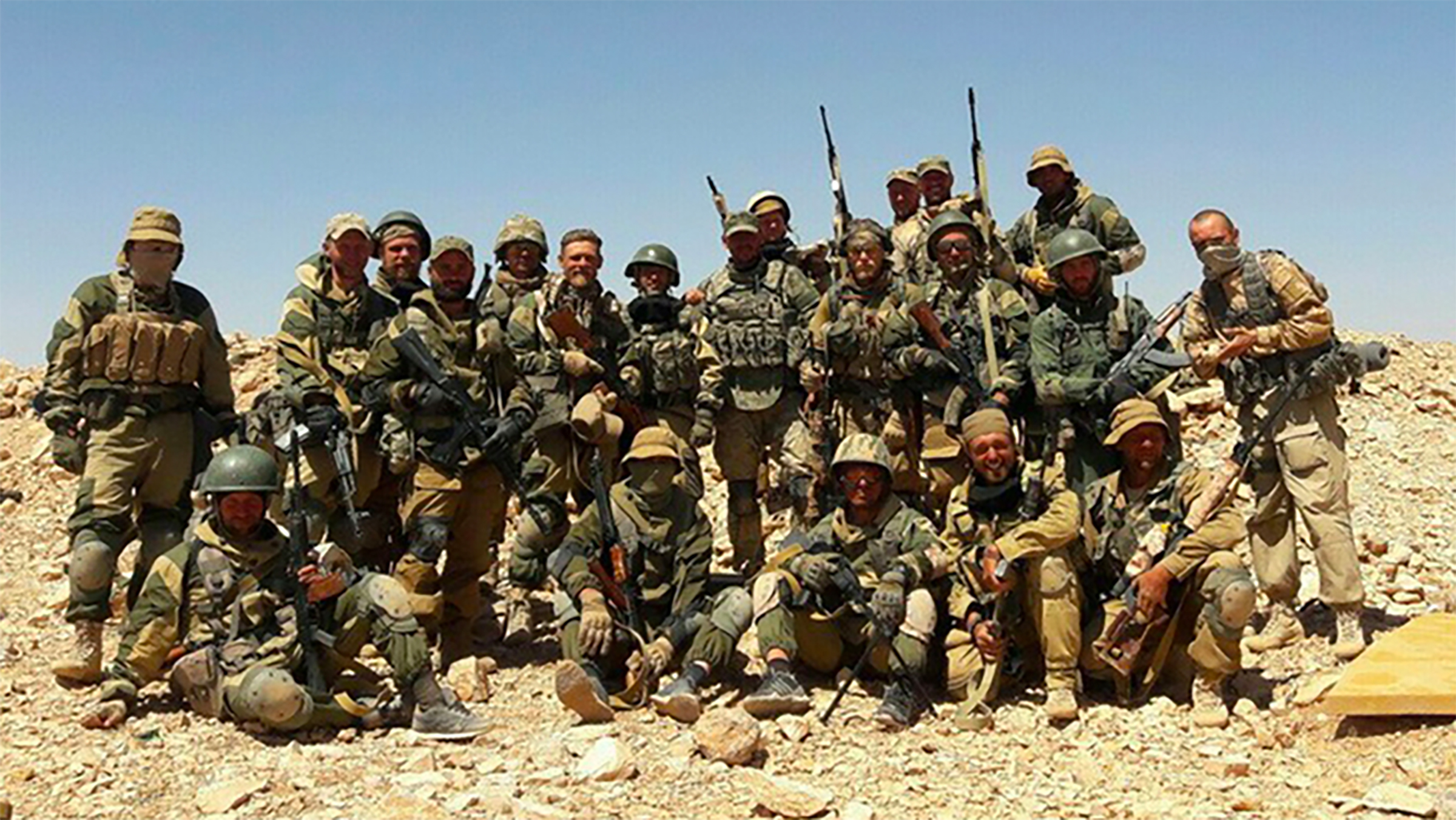
R ussian mercenaries are the all-too-real bogeymen of the war in Ukraine. Most belong to the company known colloquially as Wagner , a quasi-corporate paramilitary group connected to the Kremlin that serves as a violent tool of Putin’s foreign policy around the world. Depending on the reports you believe, Wagner mercenaries were responsible for the execution of civilians in Bucha, have deployed tens of thousands of infantry to support the eastern offensive, or have already lost 3,000 fighters in combat. Deliberate disinformation surrounds their operations, and initial reports are just that, but Wagner mercenaries often leave evidence behind, and so there are some things we can be sure of. When police from Kyiv recently posted photos on Facebook of hand grenades used as booby-traps, I had a flash of recognition, because in this case the fighters used a tactic we have seen before.
In May 2020, in western Libya, as the front lines surrounding Tripoli broke and the siege of the capital was suddenly lifted, Wagner mercenaries beat a hasty retreat across the desert. The Russians had brought in artillery and snipers to support the Libyan National Army’s final assault on the city, but when the tide turned they fled east.
Before they retreated from Tripoli, the mercenaries laid landmines and booby-traps, including hand-grenades with triplines, in civilian homes in the suburb of Ain Zara. Officials estimate these mines have killed over 50 civilians who tried to move back into their neighborhoods, not realizing they were laced with triplines. Last October, the United Nations Fact-Finding Mission in Libya directly implicated Wagner in these deaths. Landmines are banned weapons under international convention, and directly targeting civilians is a war crime.
But the Wagner operatives left more than boobytraps. They also spray-painted swastikas and SS lightning bolts as graffiti wherever they went. Nazi symbols are popular among the mercenaries; in Ukraine in April, a leader of Task Force Rusich , a Wagner subsidiary, was videotaped wearing the Valknot and Tatenkoph of the 3rd SS Panzer Division. Wagner itself is named after the notoriously antisemitic German composer, whose operas famously made Hitler weep. According to the group’s origin story, a former Spetsnaz (Soviet special forces) soldier named Dmitry Utkin used “Wagner” as his callsign while fighting in the Donbass region in eastern Ukraine in 2014. Utkin, who many consider Wagner’s operational commander, has tattoos of Nazi “SS” epaulets along his collar bones. Many founding members of Wagner also belong to the ultra-nationalist and white supremacist group known as the Russian Imperial Movement, which the U.S. State Department has declared a terrorist organization.
This linkage, between extremist armed militias and mercenaries, is one we have seen in the U.S. as well. That a mercenary company actively recruits from a white power organization is not a coincidence, and the kind of person who joins a militia bears a striking resemblance to the kind of person who joins Wagner. “It’s the same population that joins a militia or a mercenary group,” said Dr. Kathleen Belew , author of Bring the War Home: The White Power Movement and Paramilitary America . I wanted to speak to Dr. Belew because she has written extensively about international influences on white supremacists. “In the United States, militias are extra-legal,” she said. “Mercenaries are paid but acting outside of official boundaries. Both are paramilitary activity in a liminal space.”
On January 6th , when rioters attacked the U.S. Capitol, they carried a number of flags. Trump 2020 and yellow “Don’t Tread On Me” Gadsden flags and, not unexpectedly, the Confederate flag. Nazi paraphernalia as well. But other symbols were more obscure, of the Three Percenter’s militia, and even the flag of the former South Vietnam.
All of these flags embody in some way the Lost Cause, an us-against-the-world narrative that a weaker but ideologically pure group has been unfairly undermined, overwhelmed, or defeated through a stab in the back. Historian David Blight calls it “a cult of the fallen.”
But this is not just an American phenomenon, because the U.S. exports more than Hollywood and fast food. It also exports unifying racist symbols and memes. An international white supremacist online community stokes resentments across borders, creating a toxic victimhood narrative that resonates from Ukraine to southern Africa to the Middle East and then reflects back to the U.S. again. Far-right U.S. militias borrow banners on January 6th, South African mercenaries quote American movies while killing civilians, and Wagner operatives wear Confederate flags on their body armor.
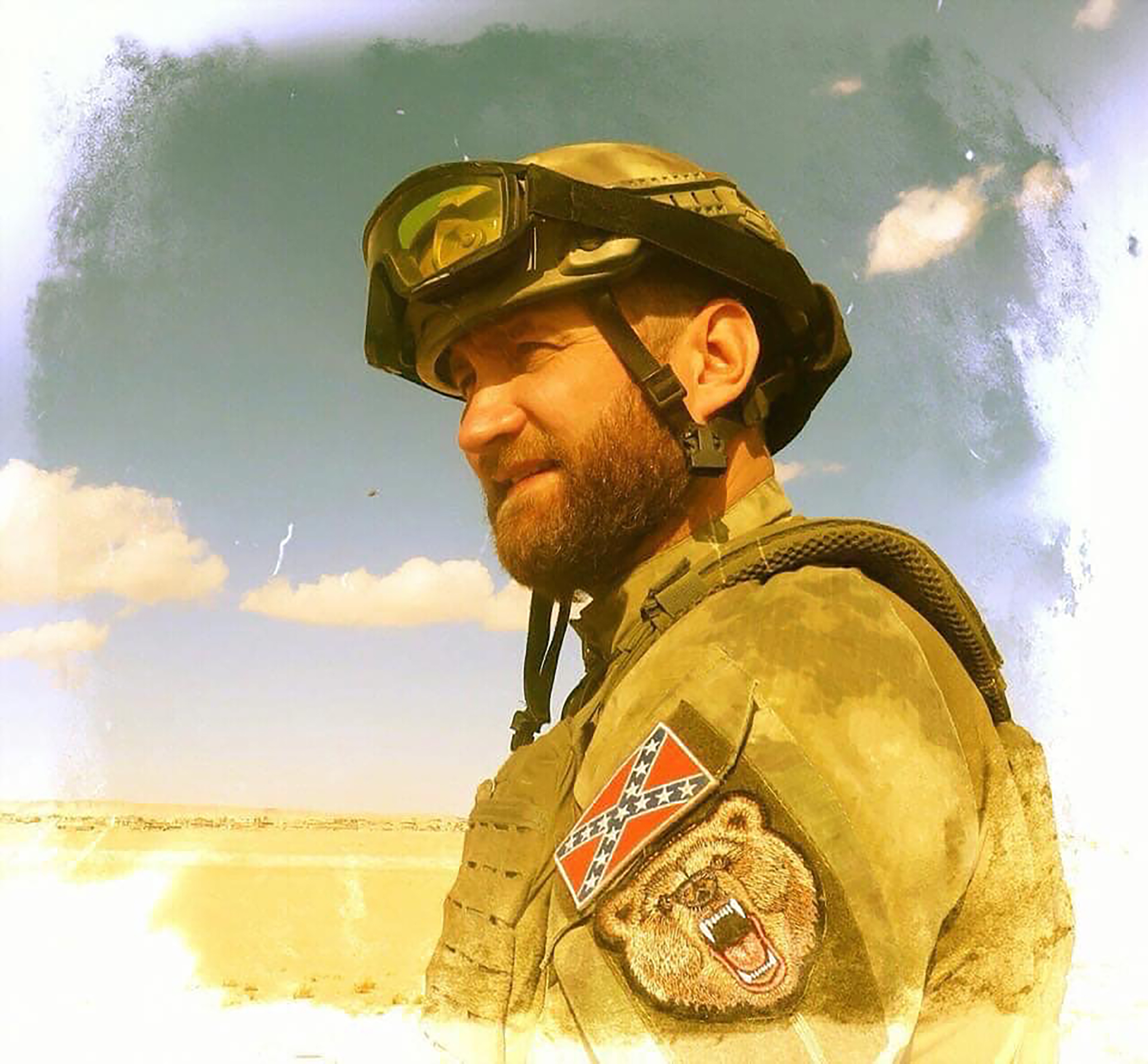
The Lost Cause is not a uniquely American myth . According to Belew, since the 1990s this trope has been deployed internationally, in the former Apartheid South Africa, and more recently in Russia, across Scandinavia, and Australia.
“They are looking for other nations that are deemed ‘salvageable,’” said Belew. “White power knows how to turn everything into a state of emergency. Adopting the Lost Cause narrative is strategic, to make whiteness under threat.”
A prime example of this Lost Cause revisionist history concerns the former African state of Rhodesia, a white-controlled enclave that fought a bloody civil war in the 1970s and is now known as Zimbabwe. Rhodesia was 5% white and 95% black, and whites viciously held onto power, even attracting hundreds of foreign white mercenaries to come fight against groups they called “terrorists.” After losing the war, many white Rhodesians would flee to South Africa, where they reinforced the apartheid regime for another 15 years.
Ever since, the American far right has been drawn to the Rhodesian Bush War, a ready-made racist Lost Cause narrative of a few white settlers fighting the swart gevaar , translated as black danger or black tide. There is a small but popular publishing industry built around stories about Rhodesian special operations forces, all-white units that occasionally let in a very few black soldiers that had been, in their words, “tamed.” The memoirs and biographies particularly glamorize the Selus Scouts, who wore blackface to conduct sabotaging “pseudo operations,” what we would now call a false flag. The ideology of these books is out in the open. The dust jacket of A Handful of Hard Men reads: “The story of a virtuoso fighter in a lost cause, and the combat companions who stood with him, against both enemies and the prevailing political winds…”
The late Rhodesia is both a powerful symbol and also a business opportunity. A number of military-themed online clothing companies sell patches and T-shirts with Rhodesian racial epithets for blacks that are unknown in mainstream American culture but catnip for the far-right. “The internet has created a truly global circulation of ideas and symbols,” said Belew. For example, T-shirts that read: “Pinochet Did Nothing Wrong !”. Online marketing explains how Dylann Roof, the white supremacist who killed nine Black people in a South Carolina church in 2015, owned a jacket with the Rhodesian flag.
Much of the style and imagery from these online merchants will be (or should be) uncomfortably familiar for American veterans, nearly identical to most “thank you for your service” gun-bro T-shirts. The jingoism in the advertisements is jarring when in historical context. For example, one company, “Grunt Style,” produced a commercial that was retweeted by Rudy Giuliani, that used the same standard Lost Cause tropes, except the hordes of the swart gevaar were replaced with Antifa, and the white Rhodesians with the blue police .
But the American white power movement doesn’t just absorb these cultural artefacts from abroad, it exports them, too. The influences are circular. In a bizarre merging of cultural references, the American killing of civilians during the Vietnam war is echoed, via Hollywood, in a new conflict in southern Africa, led by a soldier of old Rhodesia.
Dyck Advisory Group (DAG) is a South African mercenary company founded by Colonel Lionel Dyck, a white septuagenarian veteran of the Bush War and the former commander of the Rhodesian African Rifles. Online posts and clothing that bears the orange and blue Apartheid-era South African flag has been seen among his staff. As part of their business activities, DAG provides “anti-poaching” services to wildlife game parks, such as the Peace Parks Foundation, where until recently his staff oversaw security operations, and there has been at least one unlawful shooting by DAG-trained rangers, at Banhine National Park in November 2020.”.
DAG operatives have also fought in combat in Cabo Delgado, Mozambique, until losing a government contract in April 2021. Research by Amnesty International has revealed that in 2020 DAG helicopters routinely fired machine guns and automatic grenade launchers indiscriminately into villages, and dropped improvised explosive devices onto homes and hospitals, killing civilians and failing to distinguish between civilians and legitimate military targets. These may be war crimes .
Like soldiers around the world, DAG helicopter pilots and crew photographed and took video of themselves conducting operations. One such YouTube compilation , of the type a high school sports team might make to commemorate a season, shows the all-white crews loading weapons, posing next to their helicopters with their Kalashnikovs, flying over the jungles and shoreline of Cabo Delgado. The music played in the aircraft, during missions, is Creedence Clearwater Revival’s “Fortunate Son,” a self-pitying Vietnam War anthem. In a photo released after the video, one could see that the mercenaries wrote “GET SOME!” on the side of the helicopter-mounted grenade launcher. This is a reference to a scene in the classic Vietnam War film Full Metal Jacket— involving very similar helicopters, weapons, and jungles—where a machine gunner over and over yells “Get some!” while shooting at terrorized fleeing civilians. In the film, when a reporter asks “How can you shoot women and children?” the machine gunner replies “Easy, you just don’t lead them so much.”
To Belew, it is significant—a feature, not a bug—that DAG mercenaries chose both Vietnam and that movie scene to reference. “Taking up that particular identifier is meaningful,” she said, “because that’s the kind of combat that is indiscriminate and targets civilians.”
Some might seek to laugh off a twisted Vietnam movie reference as funny, though the darkest possible kind of humor. Belew disagrees. “The way people use humor and memes has really been augmented in social media,” she said. “People often have their first exposure to white power through humor. It’s the tip of the wedge to the rhetoric that follows.”
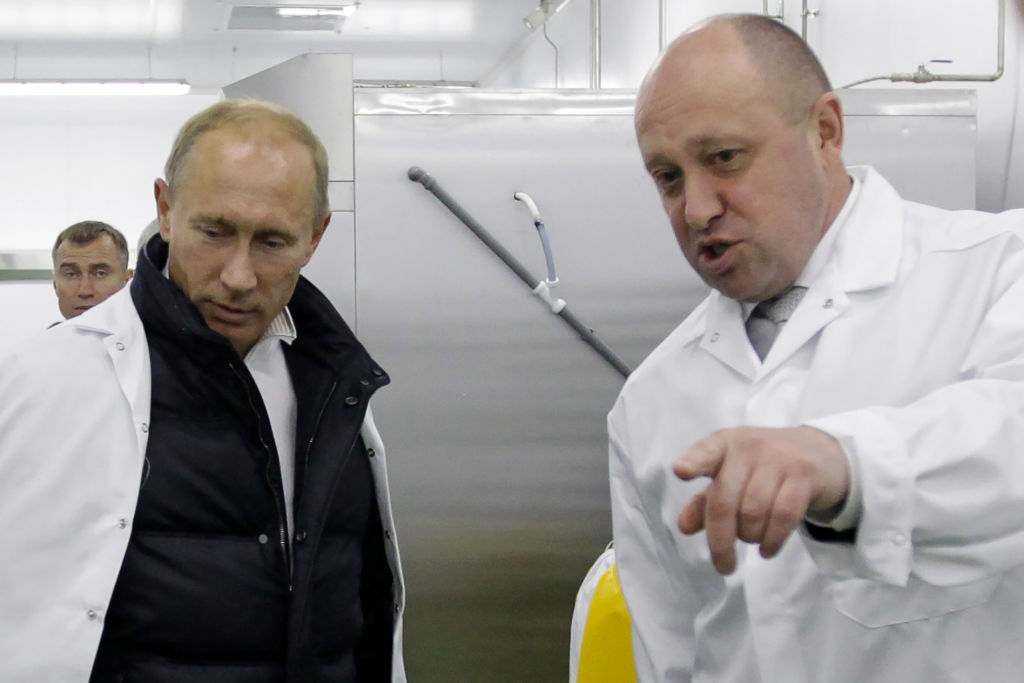
White power symbols are even more important in Russian mercenary circles, and no wonder, as the fall of the Soviet Union produced its own Lost Cause narrative.
“There are very strong parallels between loss of agency from the fall of the Soviet Union and the loss of agency in the South after the American Civil War,” said Candace Rondeaux, a professor at Arizona State University and director of the Future Frontlines program at the think tank New America, who has written extensively on Wagner.
Wagner emerged from a toxic combination of the implosion of the Soviet Union security services, a lack of employment opportunities for young men, and rising white supremacist groups. In its current form, Wagner is a constellation of private companies, all under the control of a Putin ally, recently spotted in eastern Ukraine , named Yevgeny Prigozhin . ( Prigozhin denies that he is connected to Wagner or that the group even exists, and government officials stress that mercenarism is illegal under Russian law.) Confronted in early May by a newspaper reporter who recounted Wagner abuses, Prigozhin called American and European civilization “dying out” and “a pathetic endangered bunch of perverts.” This language echoes Putin’s justification for the invasion of Ukraine.
Over the past eight years, Wagner mercenaries have fought in Ukraine, fired artillery into Tripoli and operated MiG-29 aircraft on behalf of the Libyan National Army’s commander General Haftar, supported government crackdowns against protestors in Sudan, fought rebels and are accused by the U.N. of torture and executions in the Central African Republic, are linked by Human Rights Watch to the killing of hundreds of civilians in the conflict in Mali, and, in their hereto largest role, backfilled and augmented Bashar al-Assad’s government in Syria, where, according to their rhetoric, they are fighting the swart gevaar of ISIS.
“The narrative that is frequently shared online between American white supremacists and Russian white supremacists is that the rise of ISIS is also indicative of a clash of civilizations,” said Rondeaux. “The counter to that is the rise and return of white crusaders.”
In Russia, the Lost Cause focuses on the historical primacy of white Slavic men, especially over Muslims and Jews, not to mention Black and brown people. This ancient white “purity” is expressed through the wide use of symbols: Wagner armored vehicles, fighting in Libya, are decorated with pre-Christian Viking runes. (Proud Boys founder Joe Biggs took a selfie with similar runes on his armored vest.) Recent photos taken in Ukraine indicate this iconography has influenced the broader Russian military, where we’ve seen Spetsnaz wear Wagnerian “ISIS Hunter” patches on their uniforms and tanks are decorated with runes .
But Wagner does more than adopt and propagate racist symbols. They carried out a lynching as well.
One victim was Hambi Bouta , a thirty-six-year-old husband and father of four, who travelled from eastern Syria to Lebanon, for construction work, and upon return in early 2017 was picked up at the border and conscripted into service in Bashar al-Assad’s army. Less than a month later, Bouta tried to escape, but he was caught deserting, and at some point arrived at the al-Shaer oil field, where he was held by Wagner mercenaries.
In the video that emerged in 2019, four white men carrying Kalashnikovs and wearing mismatched camouflage uniforms laugh and joke while they torture Bouta. A few try to cover their faces, but they aren’t shy about recording with their cameras. The mercenaries beat Bouta with a sledgehammer, cut off his arms with a shovel, decapitate him, string up his corpse by the feet, and light him on fire. His head they hang at the fenced gate to the oilfield. Some of the torturers appear to be drunk, and rock music plays in the background. When the men’s sweaty sunglasses and masks slip off, the videographer calls out in Russian “Hide your faces … well, whatever, this video won’t go up anywhere anyway.”
The video did get out, though, which is how we know of this war crime. One mercenary in particular stands out, a tall man with spiky blond hair and white-rimmed sunglasses, who wields the sledgehammer and carries the torch.
But when the video spread on social media, the men were not vilified or shunned. Rather, the abhorrent act and the men who did it were embraced by Russian mercenary culture. The spiky-haired man and his sledgehammer became a meme.
And the memes that emerged are instructive. The sledgehammer is the recurring totem, and the spiky-haired man appears on faux WWII Soviet recruiting posters, a symbol of Russian strength. Also in a photoshopped news conference with Vladimir Putin, or as a tattoo on a man’s leg. In a new Prigozhin-financed Russian action-movie called “The Tourist,” about Wagner’s exploits in the Central African Republic, the sledgehammer even makes a cameo.
Most shocking, though, for an American, is a meme where the spiky-haired blond man’s head appears on the body of Derek Chauvin, as the convicted former Minneapolis police officer kneels on George Floyd’s neck.
Rondeaux says most Americans continue to misunderstand fundamental nature of the Russian mercenaries. “Wagner is not an official corporate entity, like Blackwater,” she said, referencing the American security firm founded by Erik Prince. “It is both a set of contingents, that work for Russia, and an online social movement. Wagner is propaganda. More than a paramilitary group, it is a meme.”
Memes are not just the image you laugh at and share on social media. “They distill the essence of an idea, and so both reflect culture and create culture,” said Jacob Siegel, an editor at Tablet magazine, who has written extensively on meme warfare , a pernicious 21st century information war of ideas and information. Memes are an inherently digital phenomenon because they are iterative—many versions of a meme will appear, using similar photos and text, until the most-shared version, like a virus, becomes the dominant strain. Social media users, unaware that they are participating in an information war, participate by spreading the meme, posting what they think are crude harmless jokes.
But it’s not an off-color joke, or a digital accident, when memes depict the Wagner sledgehammer wielded by Pepe the Frog, the American alt-right mascot. And when the head of a Russian torturer is affixed to an American police officer, it’s not a coincidence.
“You choose to put that head on that body because you believe in the supremacy of white power,” said Rondeaux. “And America is the place that is packaged and sold.”
Wagner shares with some American militias a particular apocalyptic philosophy: accelerationism, or a desire to foment immediate radical social upheaval. Perhaps the most well-known American accelerationists are the Boogaloo Bois, the heavily armed, Hawaiian shirt-wearing militia that seeks to bring on the “big luau,” the big race war, as quickly as possible.
“At the root of accelerationism is the tension between replacement theory and the supremacy of the white race,” said Rondeaux said. Replacement is the animating anxiety for white power groups, and the motivation for Peyton Gendron’s alleged mass shooting on May 14th in Buffalo. Gendron boasted Nazi symbols and specifically targeted Black people, but think also of the chant from the 2017 “Unite the Right” rally in Charlottesville: “Jews will not replace us.” Accelerationism wants to bring on the war soon, while whites are perceived as still being in a better position to win. “The Boogaloo and the Russian Imperial Legion share a common worldview,” Rondeaux said.
The Boogaloo Bois, the Proud Boys, and Wagner are all “armed non-state actors,” to borrow a term from international law. Independent militias with ideologies. Rondeaux said that during the Cold War, “the state was primary mover and shaker when it came to collecting men to go fight for a purpose. Now different private actors, and semi-private actors, with different motivations, recruit and hire.”
The power of the international justice to control these kinds of groups is being put to the test. A year ago, in March 2021 , the Syrian Center for Media and Freedom of Expression (SCM), the International Federation for Human Rights (FIDH) in France, and the Memorial Human Rights Center in Russia filed a lawsuit against Wagner in a Russian court on behalf of Hambi Bouta, the Syrian man tortured to death on video. The plaintiffs admit there is little chance to find justice in Russian courts, but they had planned to appeal up to the European Court of Human Rights, whose judgements Russia is treaty-bound to enforce. Those are now likely dashed, as Russia has been expelled from the Council of Europe, and the window for resolving legal proceedings closes on September 16th.
Whatever the outcome of the lawsuit, the video has done its job as a meme, converted into Pepe the Frog and Derek Chauvin. “It’s a piece of white nationalist propaganda,” said Belew, “that says the execution of people of color is justified all over the world.”
More Must-Reads from TIME
- Welcome to the Golden Age of Scams
- Introducing TIME's 2024 Latino Leaders
- How to Make an Argument That’s Actually Persuasive
- Did the Pandemic Break Our Brains?
- 33 True Crime Documentaries That Shaped the Genre
- The Ordained Rabbi Who Bought a Porn Company
- Why Gut Health Issues Are More Common in Women
- The 100 Most Influential People in AI 2024
Contact us at [email protected]
Live Coverage
Welcome to the Wagner-verse, where action films serve up propaganda for Russia’s notorious mercenary army
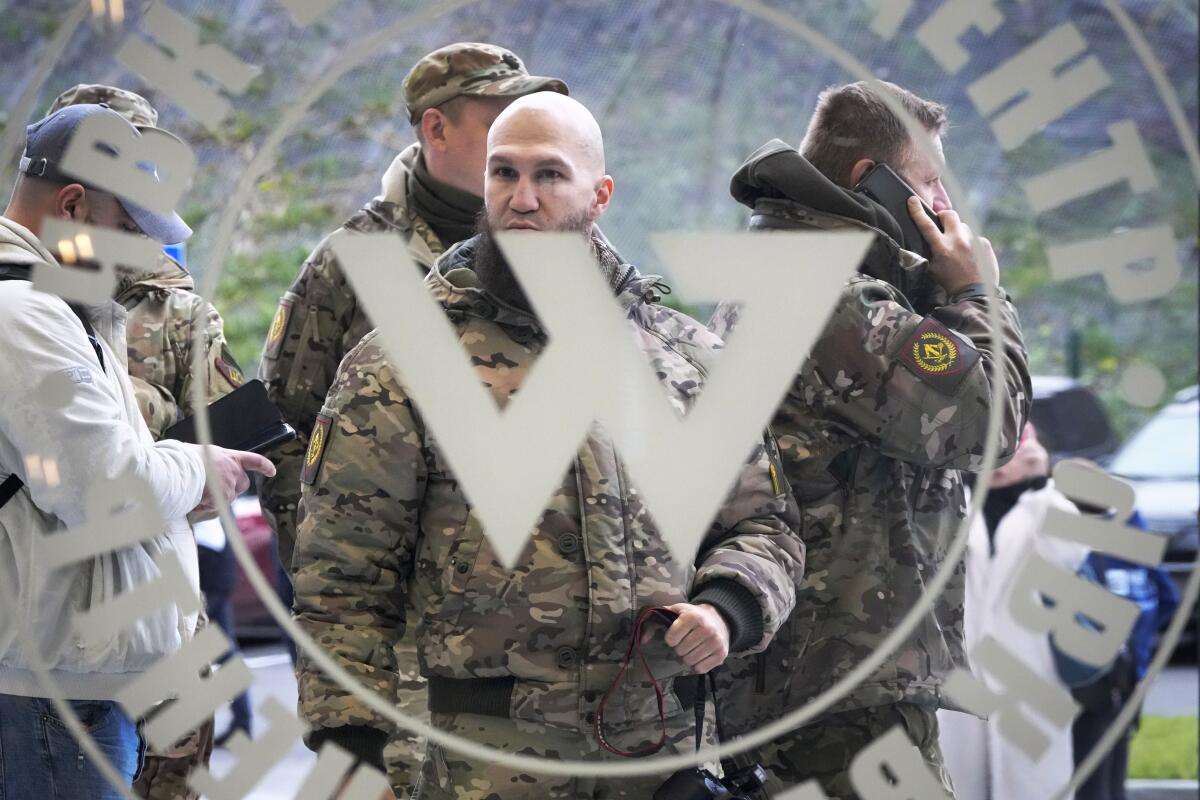
- Copy Link URL Copied!
In the action movie “Tourist,” military instructors with the Russian mercenary group Wagner deploy to the Central African Republic and find themselves reluctant warriors against rebels and a corrupt ex-politician ahead of a presidential election.
Then there’s “Granit,” another big-budget action flick whose title character, a grizzled but idealistic Russian military trainer, sacrifices himself to protect the southern African country of Mozambique from ISIS-style bandits.
And in the more recent “Best in Hell,” Wagner fighters duke it out with an unnamed enemy — clearly meant to be Ukrainians — in an unspecified location that’s an obvious stand-in for the Donbas, Ukraine’s war-ravaged eastern heartland . The movie starts and ends with the lines: “We have a contract — a contract with the company, a contract with the motherland. … We know we’re going to hell. But in hell we’ll be the best.”
Welcome to the Wagner-verse, a multimedia propaganda project encompassing action movies, documentaries, pro-war social media channels, animated shorts, comics and even children’s cartoons — all aimed at building the brand of Russia’s notorious private army, and promoting the Kremlin’s policies while they’re at it.
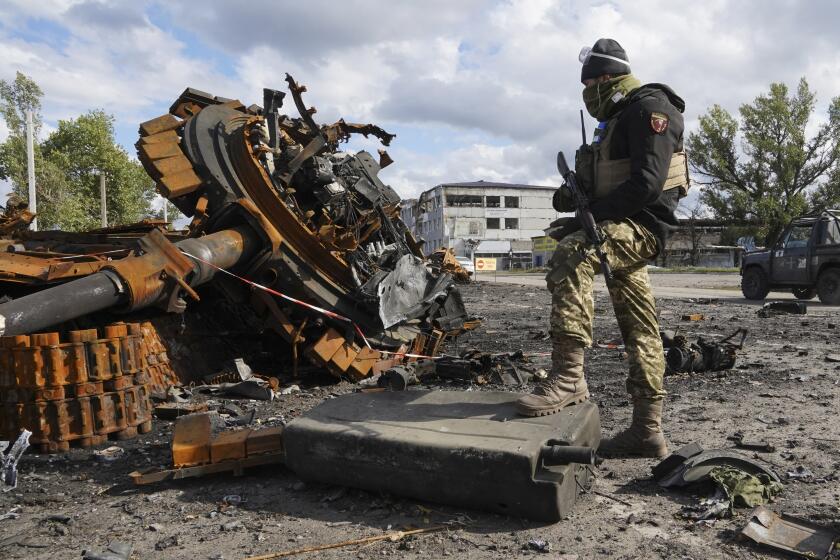
World & Nation
In the Ukraine war, a shadowy key player emerges: Russia’s private army of mercenaries
As Russia’s military performance weakens, a notorious mercenary group, long part of the Ukraine fight, steps into spotlight.
Oct. 5, 2022
The group, a security contractor similar in some ways to the U.S. private military company Blackwater, is making headlines spearheading Moscow’s no-holds-barred battle for the eastern Ukrainian city of Bakhmut. In Ukraine, its cadres — whose ranks include prison recruits — stand accused of horrific abuses against their foes, and sometimes against their own fighters.
Earlier this month, two videos emerged of presumed Wagner mercenaries beheading the corpses of two Ukrainian soldiers. Ukrainian President Volodymyr Zelensky condemned the perpetrators as “beasts” and vowed an investigation. The Kremlin said it, too, would investigate.
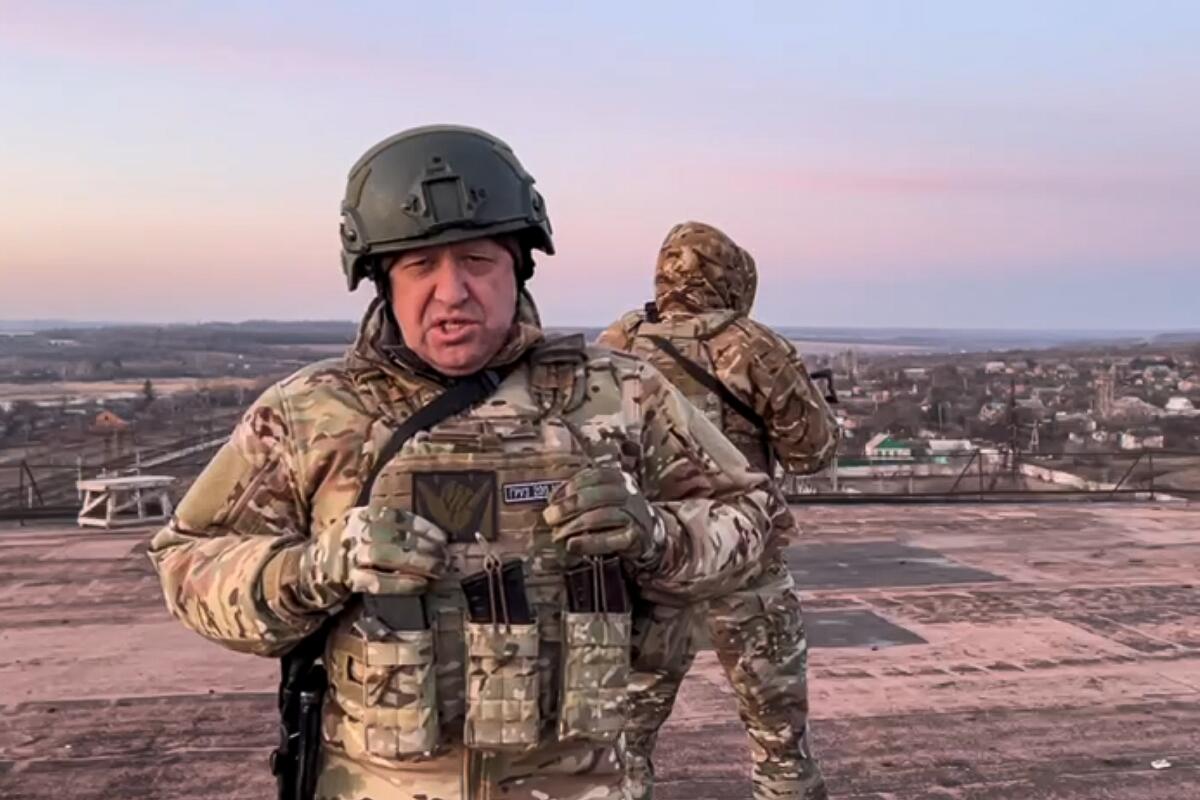
That followed footage last year of the apparent summary killing of a former prison inmate-turned-Wagner conscript who was bludgeoned to death with a sledgehammer after deserting and returning to Russia. Indeed, the sledgehammer has become the group’s calling card after its members filmed themselves clubbing a Syrian army deserter in 2017, cutting off his hands and head with a shovel, then setting his body alight.
But that’s not the image you get in the Wagner-verse. Far from brutal mercenaries, the fighters are portrayed as heroes, going beyond the call of duty to help importunate countries fend off chaos agents often linked to the West, which is held in disdain .
By contrast, unsurprisingly, Russia is shown to be a reliable friend. One children’s cartoon in French, “Lion and Bear,” depicts a Russian bear racing across continents to help a lion in the Central African Republic beat back hyenas plundering a village’s crops.
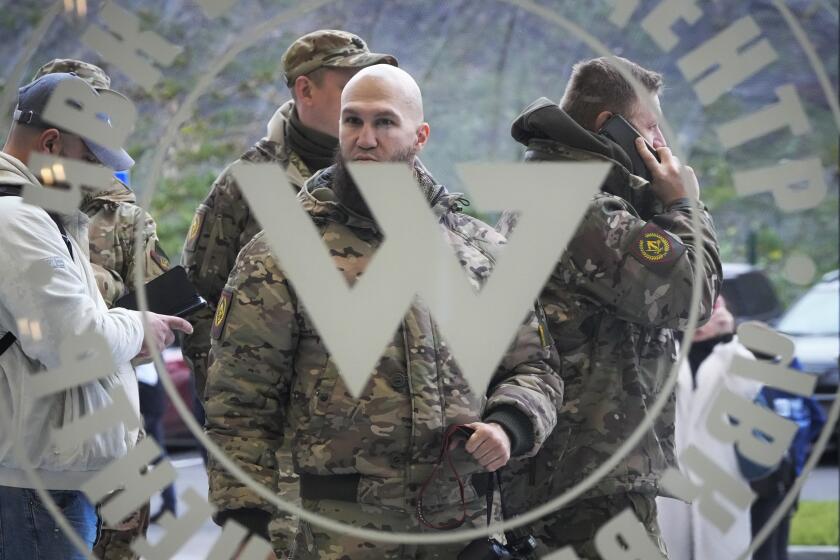
U.S. expands sanctions on Russia’s ‘brutal’ Wagner Group
The Biden administration is expanding sanctions against Russia’s Wagner Group, related companies and individuals for their role in the war in Ukraine.
Jan. 26, 2023
In another animated short, a Wagner paratrooper comes to the aid of a soldier in Mali — another African country where the company has been active — and helps him repel hordes of zombies wearing helmets with the French flag; a figure in the French presidential palace pounds his fist in frustration.
“The Americans fight for democracy. But we fight for justice,” says a Russian trainer in “Tourist.”
That’s of a piece with Russian propaganda, especially in Africa, where Moscow has long played on anti-colonial sentiment against France and other European powers, said Ovigwe Eguegu, a Nigerian policy analyst at the Beijing-based consultancy Development Reimagined, who wrote a report evaluating what he called Russia’s “private military diplomacy.”
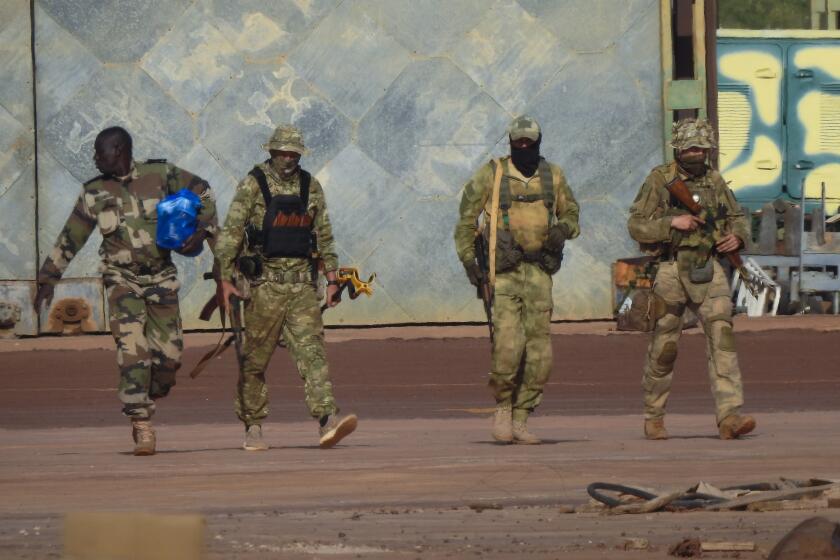
Russian mercenaries are Putin’s ‘coercive tool’ in Africa
Russia has engaged in under-the-radar military operations in at least half a dozen countries in Africa in the last five years using a shadowy mercenary force analysts say is loyal to President Vladimir Putin
April 23, 2022
“In Mali, there was a lot of anti-French rhetoric before Russian influence. But what Russian strategic communications and outlets were able to do was to fan the flames,” he said. “What it did was really position Russia as a natural ally .”
There is evidence that the messaging, though ham-handed, has played well in many of the places Wagner operates. “Tourist,” for example, had a red-carpet premiere in the Central African Republic’s capital, Bangui, that was attended by more than 10,000 people; the movie has racked up tens of millions of views on YouTube. (“Granit” and “Best in Hell” are also available on YouTube.)
During a coup in Burkina Faso in September, supporters raised Russian flags as they cheered the ouster of a president deemed incapable of quelling an uprising by rebels linked to Islamic militants. One demonstrator told the news network Voice of America: “We’re here because we want the defense of Russia,” adding that former colonial overlord France had had no success in fighting the insurgents during its multi-year deployment of troops in Burkina Faso.
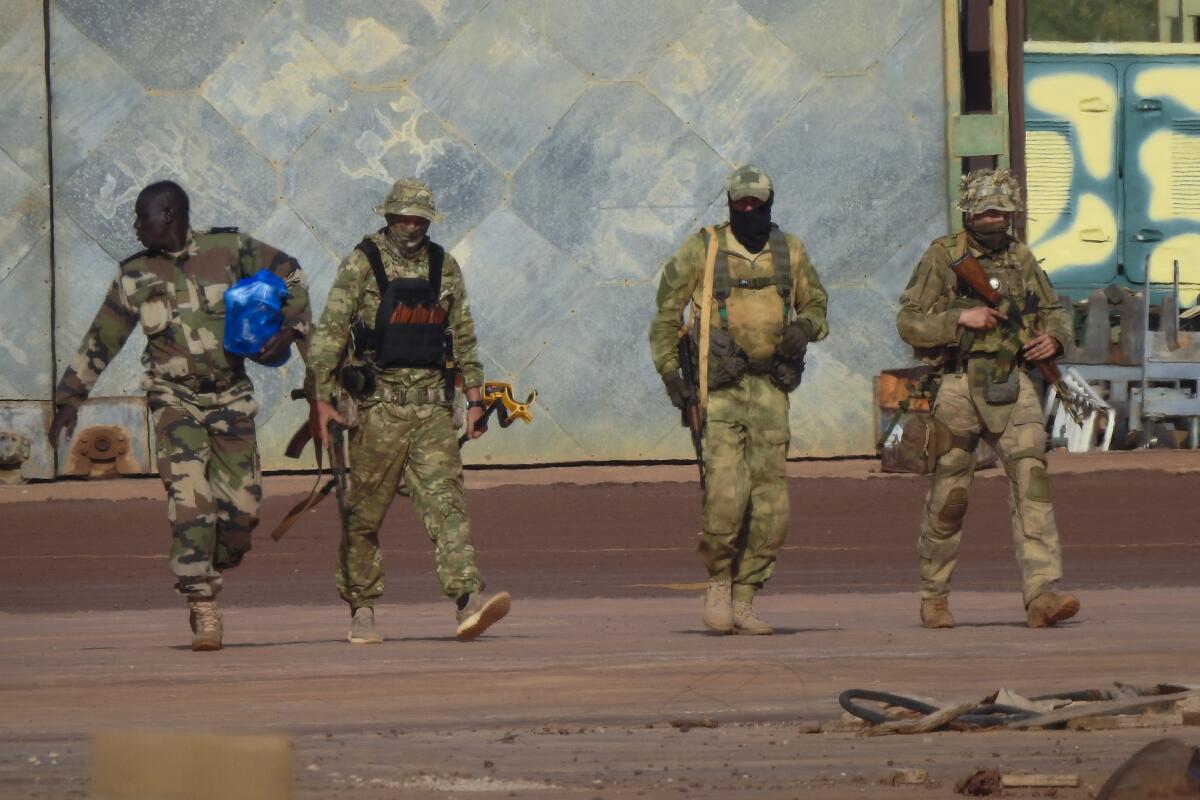
The welcome for Wagner persists despite the allegations of abuses by its fighters in Syria, Libya, the Central African Republic, Mozambique, Mali and Ukraine, including reports of summary executions, kidnapping, torture during interrogations and looting, Eguegu said.
Many Africans know that their governments’ relationships with Wagner are purely transactional, and have become desensitized to human rights abuses in their strife-torn countries, Eguegu said.
“There’s awareness of all these issues, but you have to understand: If you have mercenaries killing seven to 10 people, that’s Tuesday in the Central African Republic,” he said.
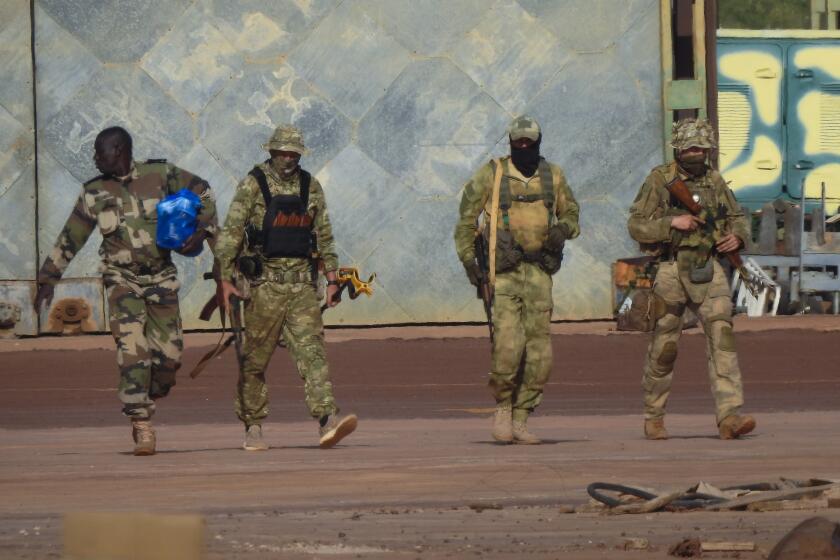
Violence soars in Mali in the year after Russian mercenaries arrive
Western officials say violence against civilians in Mali has risen in the year since hundreds of Russian mercenaries have started working alongside the West African country’s armed forces to stem a decadelong insurgency by Islamic extremists
Jan. 14, 2023
Wagner’s military operations have benefited Moscow diplomatically. Many African nations chose not to condemn Russia’s invasion of Ukraine, either because of economic or military ties, historical links with Communist figures or anger with the West for dismissing African concerns.
The Wagner multimedia propaganda campaign represents a sea change from the group’s earlier behavior, when it maintained a mostly enigmatic (journalists’ favorite word was “shadowy”) profile as a paramilitary organization whose very existence went unacknowledged.
Only last year did Yevgeny Prigozhin, an oligarch and former hot dog vendor close to Russian President Vladimir Putin, publicly identify himself as the chief of Wagner, formally called PMC Wagner, for private military company. Though under sanction by the U.S. and the European Union, Prigozhin is bankrolling films through Aurum Productions, a company he controls, to burnish Wagner’s image — and sully the West’s.
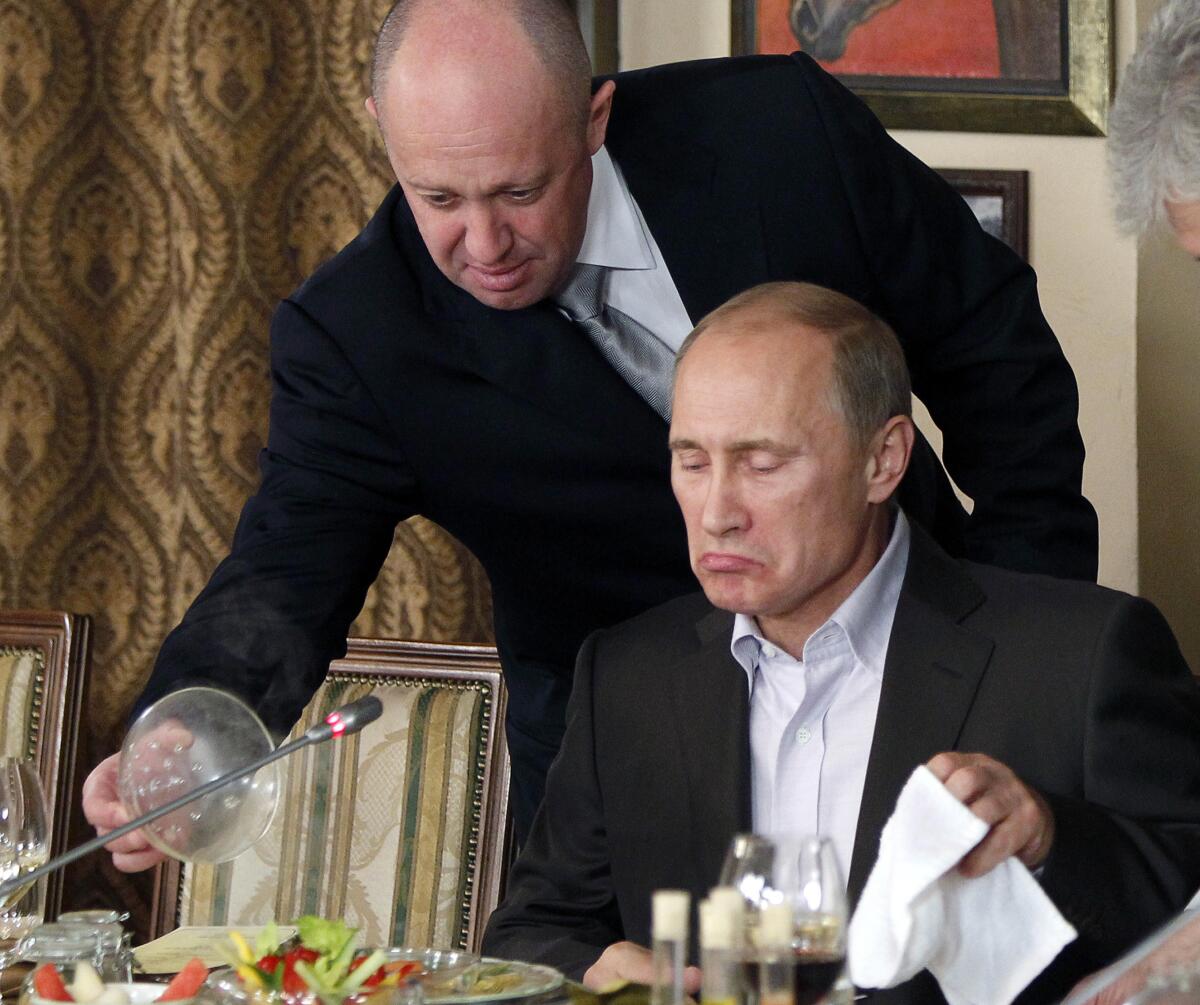
Take “Tourist.” The main character is an ex-police officer — call-sign Tourist — who lands in the Central African Republic as one of 300 trainers (presumably Wagner employees) for the national army. The assignment is not meant to include combat, until rebels rush into a village on their motorcycles and terrorize residents as part of a Western-linked coup attempt. The trainers — outnumbered, of course — join their charges to defeat their enemies. The hero is grievously wounded, and is evacuated by helicopter while a female Central African Republic soldier looks at him with sorrowful but adoring eyes. Cue credits.
The Wagner fighters are portrayed as an elite band of commandos who value every member of the team — a vision not always reflected by reality.
Despite what “Granit” would have you believe, Wagner had to leave Mozambique in defeat a few months into its deployment after the local Islamic State affiliate ambushed and beheaded a number of its men. And far from caring for its cadres, the group has employed human-wave tactics in Ukraine , throwing successive groups of fighters — usually prison recruits for the initial assault — to breach Ukrainian defensive lines.
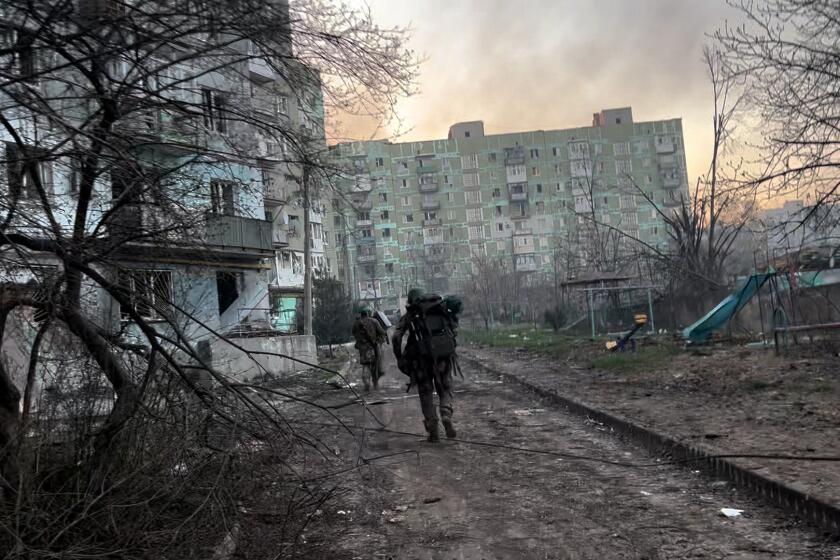
The Ukraine war’s most vicious fight is happening in Bakhmut. A rare look inside
If war is hell, there’s a credible case Bakhmut is its ninth circle, as Russia besieges the Ukrainian city that has symbolic, if not strategic, value for both sides.
April 11, 2023
“We didn’t expect in the 21st century to have an adversary using such tactics,” said Sensei, a commander in the Ukrainian army’s 3rd Mortar Brigade who is now fighting in the areas around Bakhmut. “They’re stepping over their comrades’ bodies on the way to us.”
Wagner has had prior experience in Ukraine. Indeed, its mercenaries first appeared in 2014 alongside pro-Russia separatists in Crimea and the Donbas, led by a retired special forces commander with a penchant for Nazi lore named Dmitry Utkin, call sign Wagner.
A year later, it appeared in Syria fighting a rebel uprising alongside government troops and defending oil infrastructure. Starting in 2017, it made inroads into Africa, propping up beleaguered dictators while also commandeering extractive projects in gold, diamonds, uranium, manganese and oil. In Libya, it fought with the forces of a rogue general — and former CIA asset — to defeat the internationally recognized government.
At the same time, it moved from being a run-of-the-mill private military company contracted by African governments to being an instrument of the Kremlin — but one that can be kept at arm’s length, said Lucas Webber, a researcher focused on violent non-state actors and founder of the website Militant Wire.
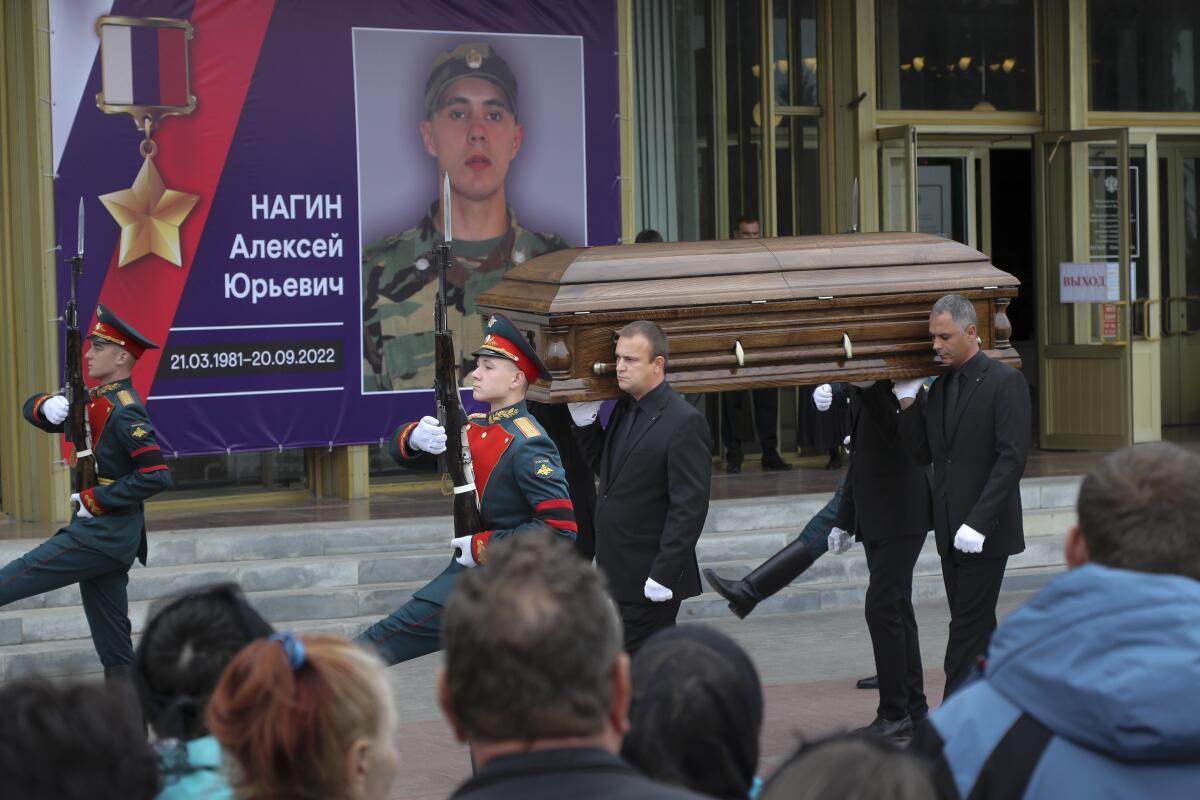
“It was a way to create some distance between the Russians, have plausible deniability and be force multipliers by training troops,” he said, describing the group as more of a semi-state organization than a traditional private military contractor.
In the last few years, Wagner has become part of a wider network of companies with Prigozhin, its chief, at the center. These include a so-called troll factory for social media manipulation , Prigozhin’s original Concord catering firm, Aurum Productions and the Paritet Film studio, and even a car wash.
And the Wagner-verse is set to expand. In November, Prigozhin opened a new corporate headquarters in St. Petersburg meant to house IT developers and entrepreneurs and provide them with “a comfortable environment for generating new ideas in order to increase Russia’s defense capability,” according to a statement he released at the time.
Gone is any reticence around the group’s existence or its name. At the front of the headquarters is a glass-clad tower; emblazoned at the top are the words “PMC Wagner Center.”
More to Read
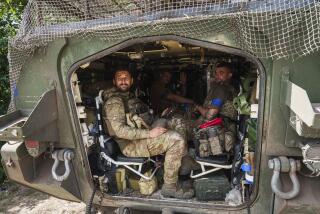
Ukraine says it has taken more ground and prisoners in Russian border region
Aug. 14, 2024

Russia’s forces turn their focus on Ukraine’s northeast in what may be an ambitious new push
Feb. 22, 2024
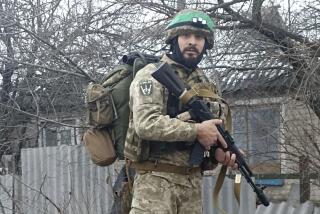
Professional soldiers from Colombia are helping Ukraine in war against Russia
Feb. 9, 2024
Sign up for Essential California
The most important California stories and recommendations in your inbox every morning.
You may occasionally receive promotional content from the Los Angeles Times.

Nabih Bulos is the Middle East bureau chief for the Los Angeles Times. Since 2012, he has covered the aftermath of the “Arab Spring” revolution as well as the Islamic State’s resurgence and the campaign to defeat it. His work has taken him to Syria, Iraq, Libya, Turkey, Lebanon, Jordan and Yemen as well as on the migrant trail through the Balkans and northern Europe. A Fulbright scholar, Bulos is also a concert violinist who has performed with Daniel Barenboim, Valeri Gergyev and Bono.
More From the Los Angeles Times

Ukraine strikes arms depots in Russia; Zelensky to meet with Biden and Harris at White House
Sept. 21, 2024

EU pledges to lend Ukraine up to $39 billion to help rebuild its economy and power grid
Sept. 20, 2024
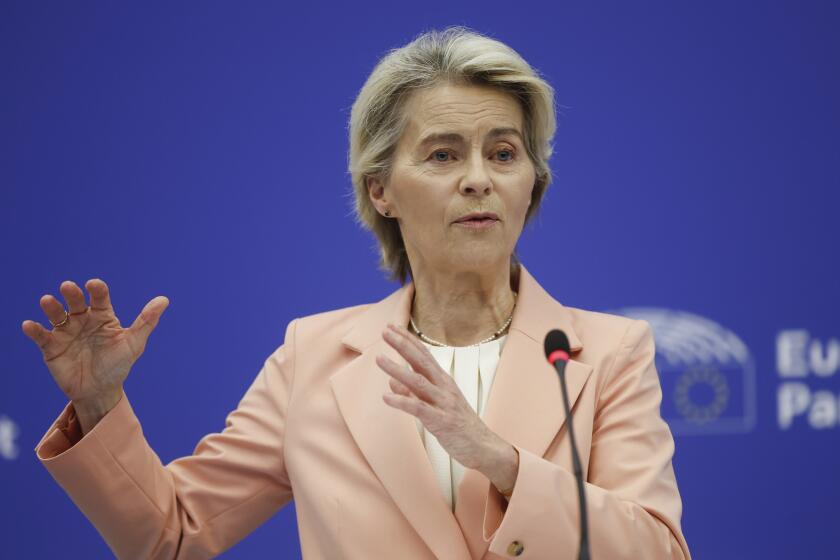
EU chief will travel to Kyiv with promise of fresh energy funds to get Ukraine through winter
Sept. 19, 2024

Column: Trump talks tough on Russia now, but as president he bowed to Putin
Sept. 17, 2024
Most Read in World & Nation

Trump says if he wins, women would ‘no longer be thinking about abortion’

Robert F. Kennedy Jr. is being investigated for allegedly collecting dead whale

Israeli forces raid, shut down Al Jazeera’s Ramallah bureau in the West Bank

Federal judge temporarily blocks Tennessee’s ‘abortion trafficking’ law
- Coming Soon Theaters • Online
- Advanced Search
- Collections Top 500
- Film Awards
- Recommendations Movies • TV Shows
- Search by Name
- Popular Top 500
- My TV Shows
- My Calendar
- Coming Soon Premieres

Movie's ratings
- Kinorium 5.8 1000+
- IMDb 5.3 406
- Critics 100% 7
- Cast & Crew
- Screenshots
Related Titles There are no related titles yet, but you can add them:

Critique: 1
The film itself is a form of conflict: Beautiful to watch, it tells us why we shouldn’t travel while simultaneously inspiring wanderlust.
Add critique link
Add a short review
280 characters

Sign up and you will see here friends impressions of the movie.
Friends comments and ratings.

In general, not bad, although films about military exploits often turn out better than not bad in our country. If you perceive it as an action movie, then at one time it’s quite. The story of how a military instructor got himself into trouble and saved a bunch of people. The actress is a little above average. Nice picture. Everything Translated to English
Movies by Triiks Media

Trending movies

The best website for movie search and thoughts sharing with friends
- Browser extension
- Santa Barbara County
- San Luis Obispo County
- Ventura County
- News Channel 3 Investigates
- U.S. / World
- What’s Right
- Local Forecast
- Interactive Radar
- SkyCam Network
- 2024 Voter Guide
- Full Election Results
- High School Sports
- College Sports
- More Sports
- Friday Football Focus
- News Channel 3-12 Livestream
- Livestream Special Coverage
- Morning News Guest Segments
- Events Calendar
- Entertainment
- Health Connections
- 805 Professionals
- Work For Us
- 805 Careers
- Advertise with Us
- Closed Captioning
- Download Our Apps
- EEO Public File Report
- FCC Public File
- How to find News Channel 12
- Public File Help
- Jobs and Internships
- Meet the Team
- Newsletters/Alerts
- TV Listings
Russian Wagner mercenaries’ African exploits immortalized on big screen

It had all the hallmarks of a Hollywood premiere: Excited crowds, a giant screen, even a red carpet.
But the high-octane, big budget film making its debut at the Barthélemy Boganda stadium in Bangui, the capital of the Central African Republic (CAR), recently wasn’t the latest episode in a star-studded action movie franchise.
Instead, the more than 10,000 people packing the stadium’s concrete seats had come to see a lavish piece of Russian propaganda: “Tourist,” a movie glorifying the mission of so-called “military instructors” in CAR , dubbed into Songo, a local language.
Yet there is much more to this movie than loud explosions, big guns, and beautiful shots of the African jungle. It neatly encapsulates how the various strands of Russian influence across the African continent have — somewhat bizarrely — come together.
As extensively reported by CNN , these Russian “military instructors” are actually part of the Wagner group of mercenaries, a secretive military contractor thought to be connected to — and financed by — Yevgeny Prigozhin , an oligarch so close to the Kremlin that he is known as President Vladimir Putin’s “chef.”
CAR has been one of the main theaters for Wagner’s soldiers of fortune . It is rich with natural resources, and politically unstable. Rebel groups have been vying with President Faustin Archange-Touadera and his government for control since elections last December.
Rose-tinted portrayal
“Tourist” opens with a flashback of Russian mercenaries coming under heavy attack from a group of Central African rebels.
The rebels are depicted as a rag-tag band of bandits, emerging from the bush on motorcycles to shoot the local population and pillage police stations. In stark contrast, the Russians are shown as the defenders of the nation; outnumbered but valiantly fighting on against all odds.
After a classic war movie opening, the rebels appear victorious: The protagonist of the film, known only by his call sign, “Tourist,” is seen lying on the ground, blood gushing from his mouth, seemingly gravely wounded.
The action then rewinds a few days, giving viewers a rose-tinted portrayal of the Russians’ work in CAR, repelling rebel attacks, alongside their partners in the local military, and thwarting their plan to storm Bangui and return former President Francois Bozize to office.
The Russian characters take digs at other Western powers in CAR throughout, with one of the mercenaries saying: “Americans say they fight for democracy; Russians fight for justice.”
The Russian “instructors” are supposed to be in CAR for training purposes, rather than frontline combat, though they appear to do far more fighting than training.
That reflects the situation in the real world: The international community knows the mercenaries may be doing some training, but they are also heavily involved in combat operations.
An action-packed war movie, “Tourist” has managed to turn itself from the stuff of fiction into a film based on a true story.
We see troops arriving on a Russian Airforce Ilyushin II-76 at Bangui’s M’Poko airport and are given to understand that the “instructors” have been rotated in and out of the country on multiple occasions.
Russia’s air force has been delivering weapons shipments and groups of “instructors” since January 2018 — with the permission of the UN, who waived an arms embargo on the country.
Recently, the spokesperson for the CAR government confirmed that a further 300 Russian military instructors were now in country, in their “bilateral capacity.”
And then there’s a tall, muscle-bound, shaven-headed instructor, who bears an uncanny resemblance to Dmitry Utkin, Wagner’s founder, and a close associate of Prigozhin. Utkin is subject to US sanctions for assisting pro-Russian separatists in Ukraine.
Prigozhin has denied any links to Wagner, but he too has been sanctioned by the US for funding the Internet Research Agency that meddled in the 2016 presidential election.
The identity of the financial backers behind “Tourist” is as opaque as those behind the Wagner group itself. The website for the movie provides no details as to who funded it, simply stating that “Tourist Film Group” holds the copyright.
But the opening credits of the movie include a reference to a studio called “Paritet Media.” Prigozhin’s wife, Lyubov Prigozhina, was listed as the owner of a company called “Paritet,” according to a St Petersburg based investigative newspaper, Fontaka.ru .
The Russian independent news outlet — based in Latvia and recently branded a “foreign agent” by the Kremlin — spoke to three people connected to the film who all said Prigozhin had financed the movie, in what one of the interviewees said was an effort to “whitewash Wagner’s image.”
A further clue hinting at Prigozhin’s involvement with “Tourist” is the appearance of Seth Wiredu. Wiredu was named by CNN in an investigation into a Russian troll factory operating out of Accra, Ghana in 2020.
In “Tourist,” Wiredu, who previously lived in Russia and spoke Russian, according to several of his employees, plays a priest who wants to bring former President Bozize back to power.
The appearance of Wiredu in a Prigozhin-linked movie about Wagner cannot be a coincidence. Indeed, it appears to be blatant trolling — a middle finger to the West.
Glorifying ‘military instructors’
Off screen, the connections between the Kremlin, Prigozhin, Wagner and “Tourist” deepen further.
On that Friday evening in Bangui, standing on a small platform beneath the giant screen stood Maxim Shugaley. A well-known political strategist with links to the Kremlin, Shugaley works for a Russian organization called The Foundation for National Values Protection (FZNC).
Shugaley and his interpreter Samer Sueifan were arrested in Libya in 2019 for political meddling and for meeting with Saif al-Islam Gaddafi, son of the country’s former ruler Muammar Gaddafi. They were released in December 2020 ; shortly afterwards a film — called “Shugaley” — was made about their time in a Libyan jail, it was followed by “Shugaley 2.”
Both movies appear on the FZNC website ; their artwork, trailers and even titles appear similar to “Tourist”.
According to reports in Prigozhin-linked media outlet RIA FAN, Shugaley told the crowd in Bangui: “I wanted to convey to the people of the CAR that there is no religious animosity in the world, there are bandits who use people’s faith to justify their crimes … the movie ‘Tourist’ will help your country come together, unite and not fight against each other.”
“Tourist” appears to be — at least in part — a much-needed attempt to improve the perception of Wagner mercenaries in CAR.
A recent UN report said Russian mercenaries had committed human rights abuses in CAR, alongside government forces, as they repelled rebel groups — something Valery Zakharov, CAR’s National Security adviser has denied.
But the movie also has a dual purpose: Glorifying the work of these “military instructors” to a domestic Russian audience. The film made its debut on Russian TV on May 19, five days after the Bangui premiere.
“The Tourist” may have immortalized the work of Wagner forever, but that title is fooling no one — this movie has about as much to do with tourism as the visit of two Russians accused of a nerve agent attack to Salisbury Cathedral.
Jump to comments ↓

CNN Newsource
News Channel 3-12 is committed to providing a forum for civil and constructive conversation.
Please keep your comments respectful and relevant. You can review our Community Guidelines by clicking here
If you would like to share a story idea, please submit it here .
- Marlene Laruelle Director, Institute for European, Russian, and Eurasian Studies (IERES), The George Washington University.
- Kelian Sanz Pascual Geopolitical analyst, Paris-based Center Geopolitics of the Datasphere (GEODE)
- Russia & Global South
- Privacy Policy
How to watch 'The Tourist' online anywhere in the world
Here's how you can watch 'The Tourist' online anywhere in the world.

Here's how to watch The Tourist online anywhere in the world.
The Tourist is a new action-packed thriller that's set to kick off 2022 with a bang. This six-part drama follows "The Man" (Jamie Dornan), a nameless British man who finds himself being run off the road by a huge truck in the Australian Outback.
After this chase, he wakes up later in hospital without any clue of who he is. On top of his amnesia, he's also got to grapple with some people from his past coming back to haunt him as he races to find out the truth about who he once was (and who he is now).
Dornan said The Tourist has "some of the most exciting scripts I've ever read", and it's sure to be an explosive series that you do not want to miss.
Here's how to watch The Tourist online from anywhere in the world so you can follow this mystery man's journey...
How to watch 'The Tourist' online in the UK
The Tourist premieres on BBC1 and BBC iPlayer on New Year's Day (Saturday, Jan. 1, 2022). For details on more of the shows you can enjoy throughout the festive season, check out our Christmas TV Guide .
There's a handy way to watch your favorite TV shows from wherever you are in the world, and it's called a Virtual Private Network (VPN).
Get the What to Watch Newsletter
The latest updates, reviews and unmissable series to watch and more!
A VPN lets you get around the usual frustrating digital barriers by changing your IP address, meaning you can watch your favorite TV shows even if you're going to be away from home.
Our favorite is ExpressVPN , which lets you change your IP address on whichever device you want to watch your new favorite show on.
From laptops to smart TVs, Amazon Fire Sticks, games consoles, and even mobile phones, you can change the address to make your device think it's in a different location to enable you to watch the things you love around the world.
ExpressVPN is one of the best VPNs out there. Not only because it is straightforward and easy to use, but it also has great security and, best of all, it comes with a 30-day money-back guarantee.
ExpressVPN is the No. 1-rated VPN in the world right now. You can try it out for a month without paying a penny, and if you sign up for an annual plan you can get 3 months' access absolutely free!

ExpressVPN is one of the easiest and affordable ways to watch what you want from anywhere you want to watch it. Plus it'll help keep your network traffic away from any prying eyes on public networks.
And it's a great way to watch The Tourist via your usual method from anywhere in the world.
How to watch 'The Tourist' online in the US
The Tourist is one of the many BBC shows coming to HBO Max over the coming months. We don't have an exact date for when it will arrive on the streaming platform, though.
Martin was a Staff Writer with WhatToWatch.com, where he produced a variety of articles focused on the latest and greatest films and TV shows. Now he works for our sister site Tom's Guide in the same role.
Some of his favorite shows are What We Do In The Shadows , Bridgerton , Gangs of London , The Witcher , Doctor Who , and Ghosts . When he’s not watching TV or at the movies, Martin’s probably still in front of a screen playing the latest video games, reading, or watching the NFL.
How to watch The Substance
How to watch Wolfs
Strictly Come Dancing 2024 is back and everyone's saying the same thing about Claudia
Most Popular
- 2 ID's crime special Riding with the Devil premieres tonight
- 3 New on Max September 21-27: our expert picks 4 new TV shows and movies coming to Max
- 4 Monsters: The Lyle and Erik Menendez Story episode 4 recap — memories
- 5 The Substance ending explained: what happens to Elisabeth and Sue?
Log in or sign up for Rotten Tomatoes
Trouble logging in?
By continuing, you agree to the Privacy Policy and the Terms and Policies , and to receive email from the Fandango Media Brands .
By creating an account, you agree to the Privacy Policy and the Terms and Policies , and to receive email from Rotten Tomatoes and to receive email from the Fandango Media Brands .
By creating an account, you agree to the Privacy Policy and the Terms and Policies , and to receive email from Rotten Tomatoes.
Email not verified
Let's keep in touch.

Sign up for the Rotten Tomatoes newsletter to get weekly updates on:
- Upcoming Movies and TV shows
- Rotten Tomatoes Podcast
- Media News + More
By clicking "Sign Me Up," you are agreeing to receive occasional emails and communications from Fandango Media (Fandango, Vudu, and Rotten Tomatoes) and consenting to Fandango's Privacy Policy and Terms and Policies . Please allow 10 business days for your account to reflect your preferences.
OK, got it!
- About Rotten Tomatoes®
- Login/signup
Movies in theaters
- Opening This Week
- Top Box Office
- Coming Soon to Theaters
- Certified Fresh Movies
Movies at Home
- Fandango at Home
- Prime Video
- Most Popular Streaming Movies
- What to Watch New
Certified fresh picks
- 89% Transformers One Link to Transformers One
- 75% Rob Peace Link to Rob Peace
- 98% His Three Daughters Link to His Three Daughters
New TV Tonight
- 94% The Penguin: Season 1
- 80% Agatha All Along: Season 1
- 82% A Very Royal Scandal: Season 1
- 85% High Potential: Season 1
- 75% American Sports Story: Aaron Hernandez: Season 1
- 100% Tulsa King: Season 2
- 63% Monsters: The Lyle and Erik Menendez Story: Season 2
- 60% Twilight of the Gods: Season 1
- 56% Frasier: Season 2
- 33% Emmys: Season 76
Most Popular TV on RT
- 65% The Perfect Couple: Season 1
- 84% The Lord of the Rings: The Rings of Power: Season 2
- 74% Kaos: Season 1
- 67% The Old Man: Season 2
- Best TV Shows
- Most Popular TV
Certified fresh pick
- 80% Agatha All Along: Season 1 Link to Agatha All Along: Season 1
- All-Time Lists
- Binge Guide
- Comics on TV
- Five Favorite Films
- Video Interviews
- Weekend Box Office
- Weekly Ketchup
- What to Watch
DC Comics TV Ranked by Tomatometer
Marvel TV Ranked by Tomatometer
What to Watch: In Theaters and On Streaming
Awards Tour
Renewed and Cancelled TV Shows 2024
TV Premiere Dates 2024
- Trending on RT
- Hispanic Heritage Month
- Transformers One First Reviews
- TV Premiere Dates
- Best Movies on Max
The Tourist
Where to watch.
Rent The Tourist on Fandango at Home, Apple TV, or buy it on Fandango at Home, Apple TV.
What to Know
The scenery and the stars are undeniably beautiful, but they can't make up for The Tourist 's slow, muddled plot, or the lack of chemistry between Johnny Depp and Angelina Jolie.
Critics Reviews
Audience reviews, cast & crew.
Florian Henckel von Donnersmarck
Johnny Depp
Frank Tupelo
Angelina Jolie
Elise Clifton-Ward
Paul Bettany
Inspector John Acheson
Timothy Dalton
Chief Inspector Jones
Steven Berkoff
Reginald Shaw
More Like This
Related movie news.
- Cast & crew
- User reviews
The Tourist

When a man wakes up in the Australian outback with no memory, he must use the few clues he has to discover his identity before his past catches up with him. When a man wakes up in the Australian outback with no memory, he must use the few clues he has to discover his identity before his past catches up with him. When a man wakes up in the Australian outback with no memory, he must use the few clues he has to discover his identity before his past catches up with him.
- Harry Williams
- Jack Williams
- Jamie Dornan
- Danielle Macdonald
- Greg Larsen
- 362 User reviews
- 43 Critic reviews
- 4 wins & 14 nominations total
Episodes 12

Top cast 99+

- Helen Chambers

- Lena Pascal

- Niamh Cassidy

- Detective Ruairi Slater

- Fergal McDonnell

- Orla McDonnell

- Donal McDonnell

- Frank McDonnell

- Detective Inspector Lachlan Rogers

- Sergeant Rodney Lammon

- All cast & crew
- Production, box office & more at IMDbPro
More like this

Did you know
- Trivia The reason season 2 is set in Ireland was because Jamie Dorman didn't want to spend several month away in Australia again. The decision was made to relocate so Jamie could be close to his family
- Connections Featured in Jeremy Vine: Episode #5.5 (2022)
User reviews 362
- marianajimenezc
- Feb 22, 2024
- How many seasons does The Tourist have? Powered by Alexa
- March 3, 2022 (United States)
- United Kingdom
- United States
- Flinders Ranges, South Australia, Australia
- All3Media International
- See more company credits at IMDbPro
Technical specs
- Dolby Digital
Related news
Contribute to this page.

- See more gaps
- Learn more about contributing
More to explore
Recently viewed.

IMAGES
COMMENTS
Release date. May 19, 2021. (2021-05-19) Country. Russia. Language. Russian. Tourist (Russian: Турист) is a 2021 Russian war film and action film directed by Andrey Batov. [1][2][3][4][5] According to Matthew Campbell, writing in The Times, it is a "most eye-catching piece of propaganda", which depicts the Wagner Group, a mercenary force ...
"The Tourist" may have immortalized the work of Wagner forever, but that title is fooling no one - this movie has about as much to do with tourism as the visit of two Russians accused of a ...
Subscribe and 🔔 to the BBC 👉 https://bit.ly/BBCYouTubeSubWatch the BBC first on iPlayer 👉 https://bbc.in/iPlayer-HomeHurt, alive, but no idea who he is. L...
The Wagner Group and the warped reality of a Russian action movie made in Africa. ... Tourist). This much is based in reality. In 2018, Russia signed an agreement with the CAR to send unarmed ...
In a new Prigozhin-financed Russian action-movie called "The Tourist," about Wagner's exploits in the Central African Republic, the sledgehammer even makes a cameo.
By Nabih Bulos Foreign Correspondent. April 25, 2023 3 AM PT. KRAMATORSK, Ukraine —. In the action movie "Tourist," military instructors with the Russian mercenary group Wagner deploy to the ...
December 2020. Former police officer Grisha Dmitriev arrives in the Central African Republic with a small group of Russian instructors. Grisha's assignment does not seem complicated, because the instructors' tasks are only to teach the local army soldiers the basics of tactics and methods of fighting. However, everything goes wrong from the start. Several bandit groups march on the capital ...
The film made its debut on Russian TV on May 19, five days after the Bangui premiere. "The Tourist" may have immortalized the work of Wagner forever, but that title is fooling no one — this ...
Tourist: Directed by Andrey Shcherbinin. With Aleksey Shevchenkov, Aleksandr Baranovskiy, Vladimir Petrov, Evgeniy Terskikh. December 2020. Former police officer Grisha Dmitriev arrives in the Central African Republic with a small group of Russian instructors. Grisha's assignment does not seem complicated, because the instructors' tasks are only to teach the local army soldiers the basics of ...
As in the tradition of Marvel films, characters introduced in "Tourist" reappear in "Shugaley 3" as well as "Granite." The PMC Wagner films share the same director as the Shugaley trilogy: Sergei Shcheglov, who began working in the Soviet film industry during perestroika and started his own production company, Triiks Media, in 2006.
The "tourist" was clearly worth my time. The actors played well, and there is no one to single out except Alexey Shevchenkov (Mock-up) and Vladimir Petrov (Tourist). After all , against the background of other pictures about PMCs "Wagner" "Tourist" looks better, especially artistically. Yes, and you can revise it.
The Tourist: Directed by Florian Henckel von Donnersmarck. With Johnny Depp, Angelina Jolie, Paul Bettany, Timothy Dalton. Revolves around Frank, an American tourist visiting Italy to mend a broken heart. Elise is an extraordinary woman who deliberately crosses his path.
The Tourist tells the story of a group of young Russian military advisors (Wagner mercenaries) sent to the Central African Republic (CAR) on the eve of presidential elections. Following a violent ...
Snoo74629. • 10 mo. ago. You can watch it on youtube. You need to translate through AI translator, there are no official translation. I think that if you are not a Russian, you will be of little interest in this film. This is the most typical war film. Its peculiarity is only in the details and in the cultural context.
Tourist (Турист, 2021), a Russian movie about Wagner Group in the Central African-Republic Locked post. New comments cannot be posted. Share Add a Comment. Be the first to comment Nobody's responded to this post yet. Add your thoughts and get the conversation going. TOPICS. Gaming. Valheim; Genshin Impact ...
ExpressVPN is one of the easiest and affordable ways to watch what you want from anywhere you want to watch it. Plus it'll help keep your network traffic away from any prying eyes on public networks. And it's a great way to watch The Tourist via your usual method from anywhere in the world. View Deal.
The Tourist. During an impromptu trip to Europe to mend a broken heart, math teacher Frank Tupelo (Johnny Depp) finds himself in an extraordinary situation when an alluring stranger, Elise ...
Johnny Depp stars as an American tourist whose playful dalliance with a stranger leads to a web of intrigue, romance and danger in The Tourist. During an impromptu trip to Europe to mend a broken heart, Frank unexpectedly finds himself in a flirtatious encounter with Elise, an extraordinary woman who deliberately crosses his path. Against the breathtaking backdrop of Paris and Venice, their ...
Shalom Brune-Franklin is Luci Miller. A young woman working in a diner in a one-horse town in the middle of nowhere, Luci has an acerbic wit and an infectious energy. But Luci is hiding a past ...
The Tourist: Created by Harry Williams, Jack Williams. With Jamie Dornan, Danielle Macdonald, Greg Larsen, Victoria Haralabidou. When a man wakes up in the Australian outback with no memory, he must use the few clues he has to discover his identity before his past catches up with him.